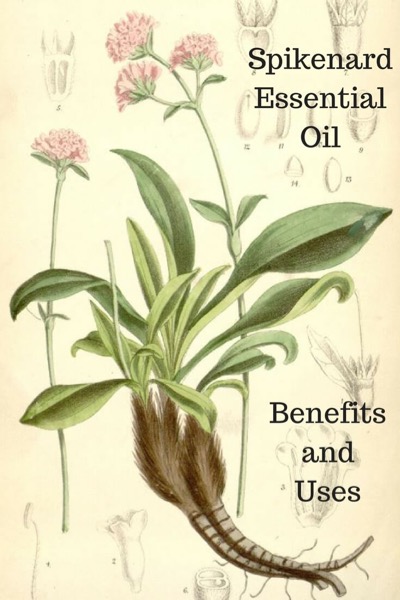- Home
- Essential Oil Profiles
- Spikenard Essential Oil
As an affiliate for Bookshop, Amazon, and other programs, I may earn a small commission for products purchased through links. This doesn't affect the price you pay. Privacy policy and disclosures.
Search this site:
Guide to Spikenard Essential Oil Benefits and Uses
Spikenard essential oil helps us release the shackles of our past, the ones "that relentlessly bind us to repeating actions that affect the freedom of of the spirit," writes aromatherapist Valerie Ann Worwood in Aromatherapy For the Soul. She also says the emotional benefits of spikenard (Nardostachys jatamansi) are to encourage forgiveness, fearlessness, calm, centering, balance, and resolution.

The availability of the essential oil is limited because of sustainability issues. You may want to know the source of any oil you buy and use it sparingly.
Basic Spikenard Facts
Plant family: Valerianaceae
Production: Steam distilled from the roots of the herb, which is native to the western Himalayan mountains. In India, where spikenard is more commonly known as jatamansi, it was used as a perfume, health-supporting herb, and skin tonic.
Aroma: Heavy, woody, warm, sweet, earthy.
Perfume/Aromatic note: Base.
Is spikenard safe to use during pregnancy? Unknown. I found sources that say yes and others that say no. Seek professional advice.
Is spikenard essential oil safe for children? Yes.
Cautions: Patch test to make sure your skin is not sensitive to the oil. Do not confuse Nardostachys jatamansi with American spikenard (Aralia racemosa).
Main components:
- nardol 10.1%
- formic acid 9.4%
- alpha-selinene 9.2%
- dihydro-beta-ionone 7.9%
Source: Essential Oil Safety, 2nd Ed.
Spikenard Aromatherapy Benefits
Aromatherapy: A Complete Guide to the Healing Art: Spikenard is useful for nervous indigestion, emotional tension, insomnia, headaches, scalp irritations, skin inflammation, rashes, and psoriasis. Although beneficial for all skin and hair types, the oil is especially good for dry and mature skin.
The Heart of Aromatherapy: Spikenard can help calm inflammation, support digestion, reduce nausea, and calm the nervous system. The oil is good for meditation and reflection and can leave you feeling relaxed and uplifted. Blend spikenard into a belly butter with orange, roman chamomile, and ginger.
The Complete Book of Essential Oils and Aromatherapy: Spikenard oil has soothing and calming effects that help relieve insomnia, menstrual problems, muscle spasm and contractions, physical tension, stress-related conditions, and anxiety. Also benefits aging skin.
The Encyclopedia of Essential Oils (updated edition): In skin care, spikenard is useful for inflammation, mature skin, rashes, and other skin issues. The oil may also help relieve insomnia, nervous indigestion, migraine, stress, and tension.
Aromatherapy For Healing the Spirit: In Traditional Chinese Medicine "spikenard oil calms the Heart, stabilizes the Mind (Shen) and settles the emotions." It also regulates the flow of Liver-Qi and of general Qi-energy. The oil is useful for relieving nervous tension, anxiety, insomnia, nausea, constipation, hemorrhoids, varicose veins, eczema, psoriasis, and inflammation.
Aromatica: A Clinical Guide to Essential Oil Therapeutics, Volume 2: Psychologically, spikenard stabilizes the mind and promotes integration. The oil also promotes stability, strength, and cognitive flexibility. Physically, the essential oil relaxes hypertonic/tense and cools hot conditions. In Traditional Chinese Medicine the essential function of spikenard is to nourish the Yin, descend the Yang, clear heat, and calm the Shen.
- The rasa (taste) of jatamansi is sweet and pungent, the vipaka (aftertaste) is sweet, and the virya (energy) is warming and moisturizing. (Marma Points of Ayurveda says the rasa is sweet, astringent, and bitter and the energy is cooling.)
- The oil decreases vata and kapha and increases pitta. (Marma Points of Ayurveda states jatamansi balances all three doshas but elevates kapha with prolonged use.)
- Tissues most affected by the oil are skin, reproductive, endocrine, and digestive.
- Indications for this essential oil include menopause, digestive problems, and mature skin. The oil is a good stimulant for the male hormonal system. Jatamansi is strongly grounding and one of the best oils for calming nerves and an out-of-balance mind. However, overuse can make you slow and sluggish.
Other uses, according to The Magic of Ayurveda Aromatherapy by Farida Irani, include hair care and growth; insomnia relief; digestive, respiratory, and circulatory support; and creating greater awareness that helps enhance spiritual growth. Emotionally, use the oil to help reduce depression, anger, hysteria, grief, stress, and fear. The oil supports clarity of mind, centering, calming, and letting go.
Subtle Aromatherapy: Spikenard intensifies devotional feelings toward a deity or spiritual teacher. The oil embodies the spirit of generosity.
The Essential Guide to Aromatherapy and Vibrational Healing: Spiritually, spikenard reminds you to be receptive to your intuition and accept the part of yourself that can imagine a better way of life for all beings. The energy of the oil embodies compassion, inner peace, nurturing, and wisdom. The essential oil helps balance emotions.
Aromatherapy and Subtle Energy Techniques: Spikenard promotes a sense of heart-centered wholeness. Used with the seventh chakra, the oil promotes love and devotion for the divine.
Sacred Oils: Spikenard removes fear of the dying process, brings comfort to those experiencing grief, and has an affinity with the heart (4th) chakra, opening the heart.
Mixing Essential Oils for Magic: Spikenard is associated with kindness and peace and aids in communication between people and with animals. The oil has cleansing properties and can be instrumental in healing.
Original Swiss Aromatics (July 17, 2025, newsletter): Use spikenard in blends for sleep support, trauma processing, or grief. The oil "speaks to the body and spirit in times of overwhelm, reminding us to exhale...Spikenard does not promote a dulling of consciousness, but supports deeper states of rest and reflection. It reminds the nervous system how to exhale, and the spirit how to yield."
Spikenard Essential Oil Uses and Blends
Use spikenard in skin care products, for grounding, and for emotional needs.
Diffuse spikenard for meditation or to help you sleep. Be aware the oil is thick and may clog some diffusers.
Make a relaxing bath oil:
- 1/2 cup jojoba oil
- 20 drops spikenard essential oil
- 10 drops orange essential oil
- One 4-ounce PET plastic bottle
Add jojoba and essential oils to bottle. Close and shake gently to mix.
To use, add a small capful of the bath oil to running bathwater. Do not use with children under five.
Source: Essential Living
Make a relaxing massage oil: Add 4 to 5 drops spikenard to 1 to 2 teaspoons carrier oil.
For rough, dry skin: Combine spikenard essential oil with olive oil. You can also use the essential oil in body butters.
For dandruff: Add a few drops of the essential oil to your shampoo.
Buy essential oils from Aromatics International (recommended).
Rocky Mountain Essential Oils.
Image Credit: Joseph Dalton Hooker (1817-1911) [Public domain], via Wikimedia Commons



